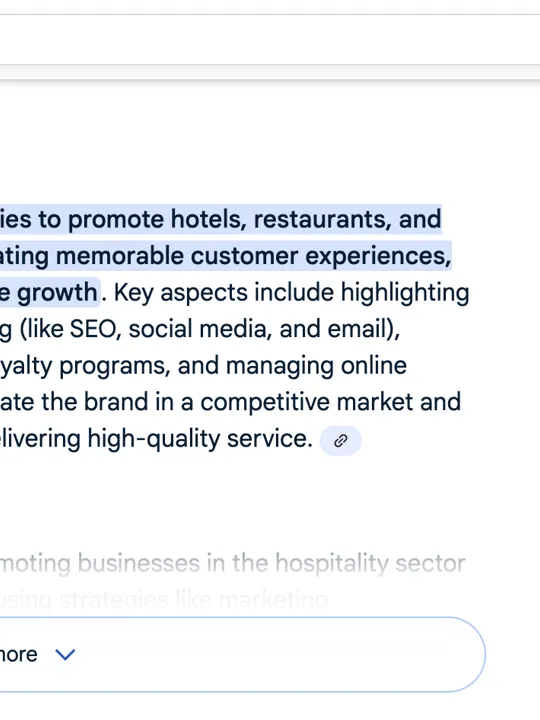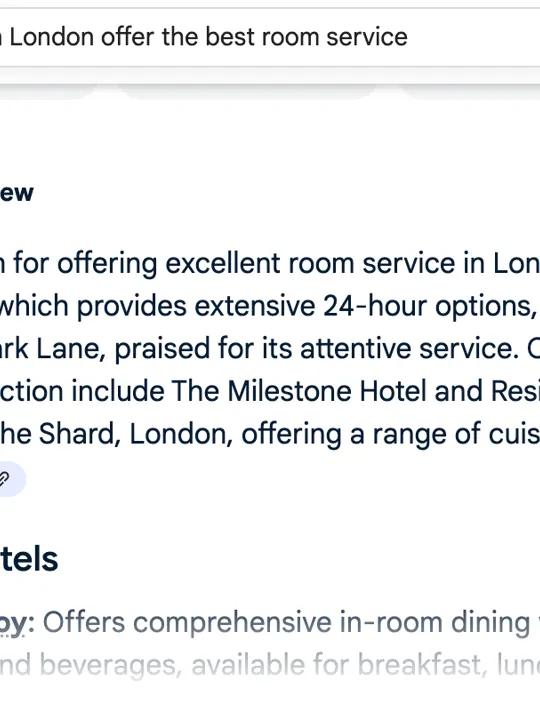Generative Engine Optimisation - The Future for Hotel Search?
The way people search for hotels is evolving fast. With AI-driven search experiences like Google’s Search Generative Experience (SGE) and other generative engines starting to reshape how users find and interact with content online, the traditional rules of SEO are no longer enough. For example, Generative Engine Optimisation (GEO): a new approach to content strategy, has entered the landscape. Designed to ensure visibility in AI-powered search results, GEO is where users receive conversational, summarised answers instead of a list of clickable links.
For hospitality businesses, this shift presents both a challenge and a huge opportunity. As generative engines begin to dominate the discovery journey, especially for travel-related queries, understanding how to optimise your content for these tools is essential. In this blog, we’ll explore what GEO actually is, why it matters for hotels, and whether it's set to become the future of hotel search. We'll also look at how GEO differs from traditional SEO, and how hotels can begin adapting their content strategies to stay visible in an increasingly AI-first world.
What is GEO?
Generative Engine Optimisation (GEO) is the process of optimising content specifically for AI-powered search experiences, such as Google’s Search Generative Experience (SGE), Microsoft’s Copilot, ChatGPT, Perplexity, and other large language model (LLM) interfaces that serve summarised answers instead of standard search result pages.
Unlike traditional SEO, which focuses on ranking web pages in a list of blue links, GEO is about earning a place within AI-generated answers. These answers are typically pulled from multiple online sources and surfaced in natural language summaries at the top of search results, often without the user needing to click through to a website.
GEO has emerged in response to the rise of AI in search. As users increasingly expect instant, conversational results, search engines have begun integrating generative AI to meet this demand. Google is leading the charge with its SGE feature, which uses generative AI to create quick overviews and suggestions within search results that are positioned above the classic ten blue links. What this means for brands is that your content now needs to be discoverable, quotable, and contextually rich enough to be selected by these engines. The shift from clickable links to conversational summaries means your content must answer questions clearly, demonstrate expertise, and provide value that AI systems recognise and trust: all things that good SEO foundations should already be doing anyway.
In short, GEO is not replacing SEO, but evolving alongside it, offering a way for your brand to remain visible in a world where traditional search is no longer the only path to discovery.

GEO vs SEO
While this may feel like a big change to the industry, it’s important to understand how GEO and SEO differ and where they overlap. Both practices aim to increase visibility and drive discovery, but they’re designed for very different types of search experiences.
The similarities
At their core, GEO and SEO both aim to connect users with the most helpful, relevant content. They rely on many of the same foundational elements:
-
High quality content that demonstrates authority and expertise
-
Strong on-page structure, including clear headings and logical formatting
-
Keyword research, especially long-tail, conversational phrases
-
Technical performance, such as mobile optimisation and fast loading speeds
-
User-first focus with content that answers real questions, clearly and honestly
Many best practices from SEO will naturally support GEO efforts, particularly those aligned with Google’s E-E-A-T principles (Experience, Expertise, Authoritativeness, and Trustworthiness). So rest assured, if you have strong SEO foundations, GEO can work in tandem.
|
SEO |
GEO |
|
|
Purpose |
Ranks pages in traditional search engine results |
Optimises content to be surfaced in AI- generated summaries |
|
Format |
Focuses on ranking URLs (click-through to site) |
Focuses on being quoted or referenced within AI responses |
|
Search Style |
List-based search with titles and meta descriptions |
Conversational, question-based search using natural language |
|
User Journey |
Click-through to full content |
Answers may appear inline, reducing clicks |
|
Optimisation |
Meta data, link-building, HTML structure |
Contextual clarity, keyword-rich answers, structured FAQs, media support |
SEO is still critical, and it ensures your content is indexed and accessible. But GEO takes things further, ensuring your content is written in a way that AI can interpret, summarise, and trust.

Why This Matters Now
As platforms like Google integrate AI-generated overviews, and users start asking full-sentence queries in tools like ChatGPT or Perplexity, GEO becomes the bridge between traditional SEO and future-first discoverability. Brands that optimise for both will maintain stronger visibility as the way people search continues to evolve.
The Benefits of GEO
For hotels, GEO presents a valuable opportunity to appear in the exact moments travellers are searching for information, even if they’re not searching directly for your brand. As AI-powered search becomes more conversational and context-driven, GEO ensures your content is ready to surface as part of these smart, instant answers. Here’s how that translates into real-world benefits for hospitality brands:
1. Greater visibility in AI search results
Traditional SEO limits your hotel’s exposure to a list of links in Google’s search results. With GEO, your content can now be quoted or referenced within AI-generated overviews, voice assistants, and zero-click answers, placing your hotel in front of users even if they never reach your website. This visibility is especially valuable when users ask location-based or experience-led questions, such as “romantic hotels in Devon with sea views” or “best family resorts near Jersey.”
2. Competitive advantage in a changing landscape
Most hotels are still optimising primarily for classic SEO. By adopting GEO early, you position your hotel ahead of competitors in emerging AI-driven platforms like Google SGE, ChatGPT, Perplexity, and Bing Copilot. This can be the difference between your hotel being featured in an AI summary vs. not being mentioned at all.
3. Drives brand discovery and trust
Because GEO content appears as part of helpful answers, not just promotions, it builds credibility and authority. A well-optimised hotel might be included in an AI-generated list of “eco-friendly boutique hotels in the Cotswolds,” even if the user hadn’t previously heard of the brand. This organic inclusion helps introduce your hotel to new audiences through contextual, trusted recommendations.
4. Captures more long-tail and conversational searches
GEO thrives on natural language and long-tail keywords, exactly the types of phrases people use when planning trips. Instead of targeting just “hotels in Edinburgh,” GEO makes it possible to rank for “best hotel for business travel near Edinburgh Waverley Station with parking and breakfast.” These longer, more specific queries are often tied to higher intent and a clearer path to conversion.
5. Aligns with voice and future search trends
As voice search and AI assistants become more embedded into everyday life, GEO ensures your content is discoverable in these formats. This is particularly relevant for hotels, where users might ask their device:
-
“Find a hotel with a spa and dog-friendly rooms near Cornwall.”
-
“Where can I stay for a winter wedding in the Lake District?”
GEO-readiness ensures your hotel is part of those answers and always getting recommended over any competitors in the area.
We Cab Help
We understand that the world of search is evolving, and it’s our job to help you stay ahead of it. Our team of SEO and content specialists is already supporting hotels as they adapt to GEO. Our approach blends traditional SEO with the emerging best practices of GEO-focused content, ensuring that your hotel ranks in both classic search results and new AI-powered overviews.
With over two decades of experience in the industry, we understand your brand voice, your audience, and the nuances that make your property unique, and we use that insight to create content that not only ranks but resonates. From structured data implementation to FAQ development, AI-optimised copywriting to content calendars aligned with GEO-friendly formats, we’ll work with you to strengthen your hotel’s visibility across both search engine results and the growing world of AI-powered discovery.
Want to future-proof your hotel’s search presence? Let’s talk.